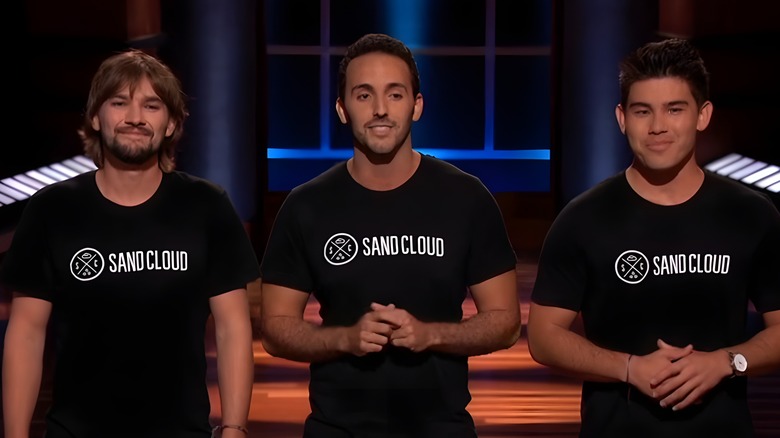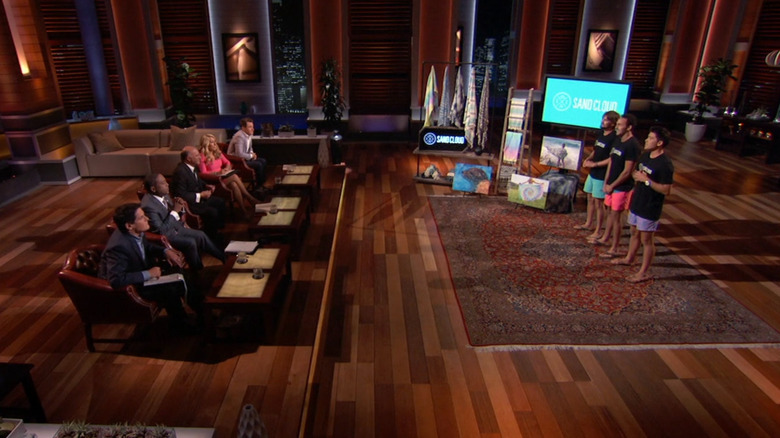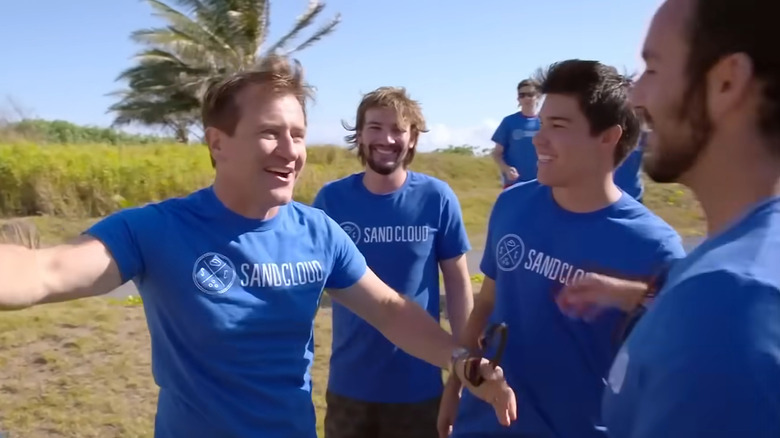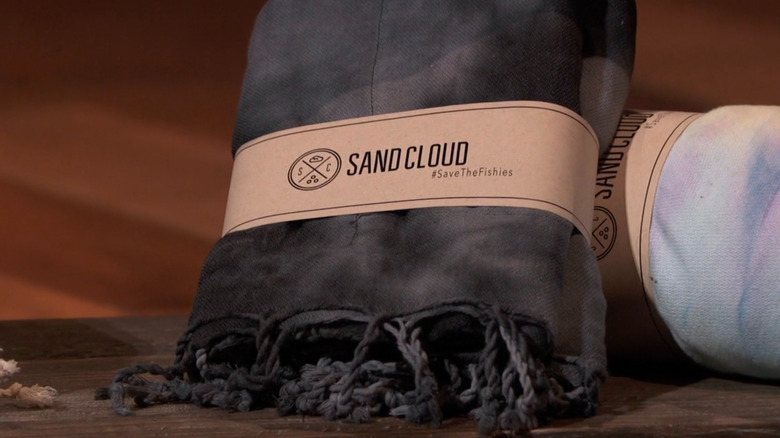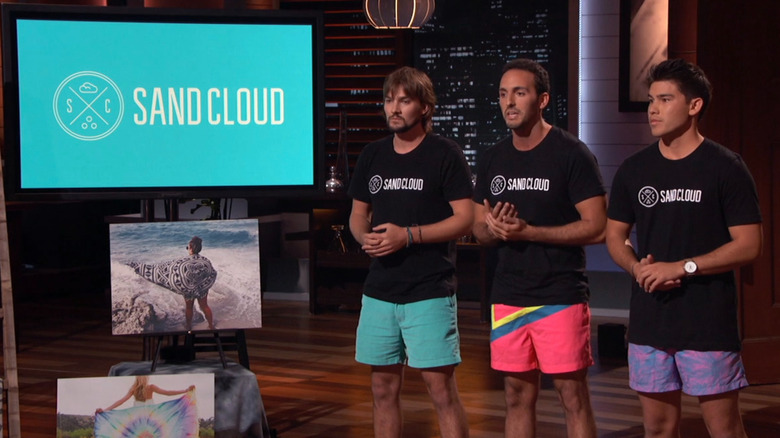Whatever Happened To Sand Cloud After Shark Tank?
Kicking off the "Shark Tank" millennial special are a trio of entrepreneurs looking to forever change both the beach towel and the world with their company Sand Cloud. The business produces specially crafted towels made from Turkish cotton and a pillow insert that gives beachgoers extra comfort. Customers often use them for other purposes such as decorative tapestry and even scarves. On top of this, Sand Cloud is dedicated to ocean protection efforts and donates 10% of its proceeds to various marine life organizations.
Sand Cloud was started by San Diego State University students Steven Ford and Brandon Leibel. The avid beachgoers came up with the idea of sewing pillows to beach towels to make it easier to nap on the shore. They sold their first version, then called Cloud Nine, to Bruno Aschidamini, a friend they met at an insurance center who would go on to become their third business partner. While gaining the interest of some family and friends, this initial attempt didn't amount to much and the team would abandon the concept not long after.
Some time later, Aschidamini brought up the idea once more and came up with a new name — Sand Cloud. Their passion reinvigorated, the guys laid out a business plan and quit their day jobs to dedicate to the new endeavor full-time. They started a Kickstarter campaign in July 2014 which managed to bring in over $15,000. In the same year, they applied to be on "Shark Tank," but were too early in their development to be considered. It wouldn't be until their third attempt in 2016 that the team managed to get a spot on the long-running ABC series.
What happened to Sand Cloud on Shark Tank?
The trio behind Sand Cloud are seeking $200,000 for 8% of their business. They capture the panel's attention right away by showing photoshopped images of the sharks' faces placed on various bodies at the beach, most notably with Kevin O'Leary's face on the body of a sunburnt man. It gets a big laugh by Mr. Wonderful, who playfully proclaims, "You think there's a chance in hell you're getting 200 grand from me?"
The sharks are initially concerned that the fabric isn't absorbent enough, although the entrepreneurs explain that the Turkish fabric is more effective than it seems, especially for beachgoers. An average towel prices at $47 and costs $10 to make. In their first year, the team brought in $30,000, which exploded into $430,000 the following year. They are at $1.6 million year-to-date with projections of hitting $3 million. Despite having 80% margins, they will only be making $800,000 off the $3 million, as they reinvest much of their profits back into the company. They are hoping to use the investment to aid in website optimization and marketing efforts.
Lori Greiner likes the brand but her vision doesn't line up with that of the entrepreneurs and she goes out. Mark Cuban is willing to give out $400,000 for 25% equity. The guys ask if they can hear the other sharks out first and Cuban goes out. Daymond John asks for $300,000 at 25% but also exits when the Sand Cloud team counter with only a 10% stake. O'Leary and Robert Herjavec make the same offer of $200,000 for 15%. At the end, they take Herjavec's deal.
Sand Cloud after Shark Tank
As with countless "Shark Tank" companies, Sand Cloud experienced a massive surge in website traffic after its episode aired, a phenomenon commonly referred to as the "Shark Tank" effect. Amongst the night of its broadcast on February 24, 2017, the company's website saw 13,000 new visitors.
In Season 9, Sand Cloud returned for an update segment. In the four months since appearing on "Shark Tank," the company has made $2.7 million. The segment shows its founders and investor Robert Herjavec assisting in a beach cleaning effort in Hawaii. "I love my investment in Bruno, Steve, and Brandon," Herjavec said. "I think not only are we going to make a lot of money, but we're going to save a lot of fishes." In 2017, the team projected sales of $7 million.
Herjavec's help and the boost from "Shark Tank" helped Sand Cloud find fun ways of expanding its inventory. In 2018, the company announced that it would start selling sustainably produced accessories such as water bottles, T-shirts, and jewelry. "We realized we had a brand and people felt comfortable repping Sand Cloud as a company," co-founder Brandon Leibel told Inc. Magazine. "We wanted to take advantage of that and give people from all over the world–who don't necessarily live by the beach–an opportunity to represent Sand Cloud and what we stand for."
Is Sand Cloud still in business?
Sand Cloud has continued to successfully operate since its time on "Shark Tank." Visitors to its website will discover no shortage of options. Its beach towels come in a wide variety of original and even licensed designs with the likes of brands such as "Star Wars" and "Harry Potter." The company also sells bathing items, sunscreen, kitchen accessories, umbrellas, and much more. Buyers can find Sand Cloud and much of its product line on Amazon. Additionally, Sand Cloud is also available in numerous retail locations in states such as New York, Connecticut, and Massachusetts.
Over the years, Sand Cloud has been deemed one of the most successful companies to come out of "Shark Tank." USA Today placed Sand Cloud amongst its list of the 20 best-selling "Shark Tank" products alongside other hit ventures such as Scrub Daddy, Squatty Potty, and Cousins Maine Lobster. The company itself found its way on Inc. Magazine's list of the 5000 fastest-growing companies in California in 2020, while co-founders Steven Ford and Brandon Leibel were part of Forbes 30 under 30 in social entrepreneurialism. By 2018, Sand Cloud had made $20 million.
What's next for Sand Cloud?
It's hard to believe that Sand Cloud got its start as an idea from a group of cash-strapped roommates. The company has more than proven itself as a worthwhile investment for Robert Herjavec, as its stylish lineup of products and hefty sales numbers only continue to expand. The only thing stronger than Sand Cloud's growth as a business is its team's continued dedication to making the world a better place, one towel at a time.
In Sand Cloud's mission to preserve and protect the world's oceans, the company has partnered with several non-profits such as the Coral Restoration Foundation, the Pacific Mammal Center, and the New Zealand Whale & Dolphin Trust. Over the years, Sand Cloud has donated over $100,000 to these and several similar efforts.
These environmentally conscious steps extend to Sand Cloud's product line. Amongst announcing its move to start selling accessories, the company shared that it would fully transition to selling 100% sustainably made apparel by the summer of 2019. It's unknown if Sand Cloud has met this goal as of now, but the team is nevertheless confident that the decision is an essential one. "Our lifetime fans that will support us with any product we come out with because it's more than just buying the product," co-founder Brandon Leibel said in an Inc. Magazine interview. "They are buying into the mission and what we stand for."
